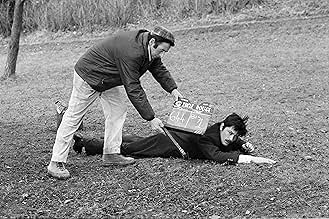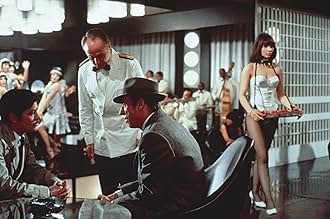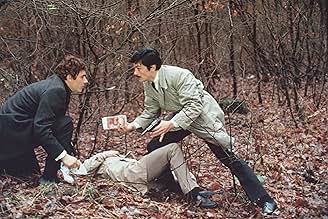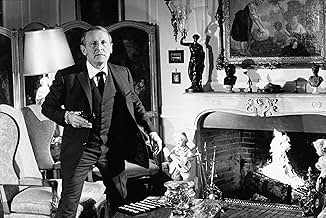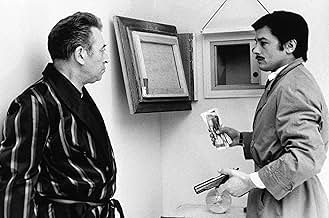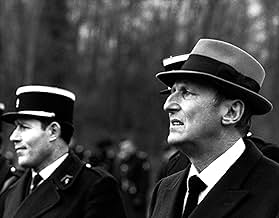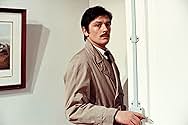PUNTUACIÓN EN IMDb
7,9/10
31 mil
TU PUNTUACIÓN
Tras salir de la cárcel, el experto ladrón Corey se cruza en el camino con un conocido prófugo y un antiguo policía alcohólico. Los tres trazarán el plan de un elaborado golpe.Tras salir de la cárcel, el experto ladrón Corey se cruza en el camino con un conocido prófugo y un antiguo policía alcohólico. Los tres trazarán el plan de un elaborado golpe.Tras salir de la cárcel, el experto ladrón Corey se cruza en el camino con un conocido prófugo y un antiguo policía alcohólico. Los tres trazarán el plan de un elaborado golpe.
- Dirección
- Guión
- Reparto principal
Bourvil
- Le Commissaire Francois Mattei
- (as André Bourvil)
Gian Maria Volontè
- Vogel
- (as Gian-Maria Volonte)
François Périer
- Santi
- (as François Perier)
Anna Douking
- L'ancienne amie de Corey
- (as Ana Douking)
Reseñas destacadas
This is only the second film I've checked out on IMDB and both have had negative user comments. In this case the person contributing comments was a tad chauvinistic and appeared to be strongly biased against French movies. I am English and can't get enough of French movies,but I also can't get enough of GOOD movies, be they English, American, French, Italian, whatever. Whichever way you slice it Le Cercle Rouge is a masterpiece, shot by a director at, as the cliche has it, the height of his powers. Cool, stylish, slick, professional,call it what you will, it's a winner. Everyone is on top of their game,not least Bourvil in a rare attempt at straight acting - he is best known as a zany comic in a series of box office smashes that don't translate well into English. The Melville schtick, a set-piece, is a doozy this time around, a jewellery heist on the Place Vendome, carried out in total silence in a nod to Rififfi and if anything surpassing it. The sombre,muted tones, embody the sense of cool and also the melancholy that informs the film making anything other than a downbeat ending unthinkable. Like the man said, if you only see one movie this year make it this one.
Everyone likes the coolly created, memorable heist movie. Alain Delon provides the antihero, Melville provides the cool, and a handful of other great talent (Yves Montand, Gian Maria Volonte, and Andre Bourvil, mostly) arrives to add a crisp engaging movie...
...with very little dialog. This is great, because one certain aspect of the genre tends to be a lot of dialog involving the quick-witted and their various repartees. This movie, however, could be watched with the sound completely off and not too terribly much would be missed. Not to say the sound is bad, oh no, the jazzy soundtrack and the crisp audio catching the little movements makes the slow, patient deliberation of the patients very compelling.
What's also really neat about this film is that the color cinematography is pretty fantastic. Usually when it comes to cinematography, black and white movies tend to stick out in my mind, but this film has some very strong and beautiful imagery that makes the movie pure visual pleasure to observe.
--PolarisDiB
...with very little dialog. This is great, because one certain aspect of the genre tends to be a lot of dialog involving the quick-witted and their various repartees. This movie, however, could be watched with the sound completely off and not too terribly much would be missed. Not to say the sound is bad, oh no, the jazzy soundtrack and the crisp audio catching the little movements makes the slow, patient deliberation of the patients very compelling.
What's also really neat about this film is that the color cinematography is pretty fantastic. Usually when it comes to cinematography, black and white movies tend to stick out in my mind, but this film has some very strong and beautiful imagery that makes the movie pure visual pleasure to observe.
--PolarisDiB
After leaving prison, master thief Corey (Alain Delon) crosses paths with a notorious escapee and an alcoholic former policeman. The trio proceed to plot an elaborate heist.
The movie has its critics, particularly those who think it is too slow. And, indeed, even when cut down to 99 minutes and dubbed in English, critic Vincent Canby still found it to be a tad slow. Most of the film has no music, which keeps the pace slower, and there is the notorious heist scene featuring no dialogue for thirty minutes. For some, that may be intolerable.
Melville is a master, and possibly the most underrated director of his era. His name means nothing to so many people, and yet he never made a bad film. Even when relying on cliché (such as crossing a river to avoid detection), he does it with finesse.
The movie has its critics, particularly those who think it is too slow. And, indeed, even when cut down to 99 minutes and dubbed in English, critic Vincent Canby still found it to be a tad slow. Most of the film has no music, which keeps the pace slower, and there is the notorious heist scene featuring no dialogue for thirty minutes. For some, that may be intolerable.
Melville is a master, and possibly the most underrated director of his era. His name means nothing to so many people, and yet he never made a bad film. Even when relying on cliché (such as crossing a river to avoid detection), he does it with finesse.
"Le Circle Rouge" from 1970 is a French film. That's another way of saying that a lot of Americans won't like it and won't understand this gritty and underplayed film. The title comes from a made-up Buddhist saying, "When men, even unknowingly, are to meet one day, whatever may befall each, whatever the diverging paths, on the said day, they will inevitably come together in the red circle." Melville made up a saying for Le Samourai as well.
One thing we've lost in filmmaking in this country is the art of the buildup. You have to get to the point of the story in five minutes. This film is about a jewelry heist, and the jewelry heist happens very late in the film.
Corey (Alain Delon) is released from prison after five years. Just before he leaves, one of the guards tells him about a jewelry heist he can get in on. Corey is uncertain, so instead he goes to his old boss Rico and steals money from him. Rico sends thugs after him to retrieve the money.
In a parallel plot, a criminal Vogel (Gian-Maria Volonte) is being transported by train and escapes. He winds up hiding in Corey's trunk while Corey is in a restaurant.
Corey finds him, hears his story, and lets him travel by trunk. The car is cut off by Rico's people, and in the ensuing fight, Corey loses the money. Now broke, he decides to join the jewelry heist and include Vogel.
They invite a former police detective, Jansen (Yves Montand) to join them. He is a bad alcoholic having the DTs. Somehow he manages to pull himself together and meet with them. The heist is on.
I would be surprised if there is one page of dialogue in this script, and yet you keep watching. Perhaps influenced by another classic, Rififi, the heist is carried out in complete silence.
The director, Melville, does a magnificent job of keeping us interested, even if there is not much background given of the characters. We know that Delon's boss is sleeping with his former girlfriend, and that's about it. We don't know what made Montand an alcoholic. Melville keeps us focused on their objective.
The acting is very smooth, with Volonte (Vogel) a standout who also has the best role. His scene of escaping police and dogs is one of the best scenes in the movie.
The police commissioner in the movie states that in the end, all men are guilty, even the police. He believes that we are all tainted with original sin. Maybe so. "Le Circle Rouge" won't do much to convince you otherwise.
One thing we've lost in filmmaking in this country is the art of the buildup. You have to get to the point of the story in five minutes. This film is about a jewelry heist, and the jewelry heist happens very late in the film.
Corey (Alain Delon) is released from prison after five years. Just before he leaves, one of the guards tells him about a jewelry heist he can get in on. Corey is uncertain, so instead he goes to his old boss Rico and steals money from him. Rico sends thugs after him to retrieve the money.
In a parallel plot, a criminal Vogel (Gian-Maria Volonte) is being transported by train and escapes. He winds up hiding in Corey's trunk while Corey is in a restaurant.
Corey finds him, hears his story, and lets him travel by trunk. The car is cut off by Rico's people, and in the ensuing fight, Corey loses the money. Now broke, he decides to join the jewelry heist and include Vogel.
They invite a former police detective, Jansen (Yves Montand) to join them. He is a bad alcoholic having the DTs. Somehow he manages to pull himself together and meet with them. The heist is on.
I would be surprised if there is one page of dialogue in this script, and yet you keep watching. Perhaps influenced by another classic, Rififi, the heist is carried out in complete silence.
The director, Melville, does a magnificent job of keeping us interested, even if there is not much background given of the characters. We know that Delon's boss is sleeping with his former girlfriend, and that's about it. We don't know what made Montand an alcoholic. Melville keeps us focused on their objective.
The acting is very smooth, with Volonte (Vogel) a standout who also has the best role. His scene of escaping police and dogs is one of the best scenes in the movie.
The police commissioner in the movie states that in the end, all men are guilty, even the police. He believes that we are all tainted with original sin. Maybe so. "Le Circle Rouge" won't do much to convince you otherwise.
THE RED CIRCLE (Jean-Pierre Melville - France/Italy 1970).
This might be the coolest film ever made, in the most literal sense of the term. The men here never lose control and never - not once - show their emotions. No dramatic outbursts in this film. Everyone is cool all the time. It's an abstract dream-world, where the men live by their own code, a gangster code with the values of the outside world conspicuously absent. In this masterfully filmed heist saga, Melville tackles the American crime thriller in his distinctly dark and desolate style, yet made in grand fashion with a hefty budget of ten million dollars and with four of the greatest French stars at the time. Alain Delon as the master thief, Yves Montand as an alcoholic ex-cop, Italian star Gian-Maria Volonté as an escaped criminal and André Bourvil in an atypical role as the cynical police chief.
Melville described LE CERCLE ROUGE as his penultimate film and it is indeed a masterfully stylized policier. He also claimed he wanted to shoot a film noir in colour and in many ways he succeeded. The two primary influences for this film were John Huston's 1950 heist movie THE ASPHALT JUNGLE and Jules Dassin's RIFIFI (1955). But unlike these films, where we learn much about the background of the individual gang members, with all their petty needs and worries that motivate them, making clear these are not just ruthless underworld types, but ordinary individuals engaged in a world of everyday worries and human endeavour, Melville, though, tells us almost nothing about his criminals. Why was Corey (Alain Delon) in jail? Why was his associate, Vogel (Jean-Marie Volonté) arrested in the first place? Or why the ex-police marksman Jansen (Yves Montand) left the force, was it his alcoholism? We never learn the motivations behind their actions and never find out what drives these men. Women are even more absent than in his earlier films, with the "emotional" ties exclusively between men. They don't even seem to have personal lives. A sort of an emotional twilight zone and although the setting is not as abstract as in his earlier LE SAMOURAI (1967), Melville still sketches a very eerie world. Melville's favorite actor, Alain Delon, is perfect and almost outdoes himself in coolness, if imaginable.
Deliberately paced and with a length of over 140 minutes, Melville takes his time to tell the story, but its slow pace and length seems a perfect way to show the desolate world these men live in. Nothing is ever out of place in Melville's films and here it's no different, every little detail seemingly of pivotal importance for the story. Although LE SAMOURAI remains my favorite Melville film, even up there with the greatest films ever made, this one also belongs to the very best.
Camera Obscura --- 10/10
This might be the coolest film ever made, in the most literal sense of the term. The men here never lose control and never - not once - show their emotions. No dramatic outbursts in this film. Everyone is cool all the time. It's an abstract dream-world, where the men live by their own code, a gangster code with the values of the outside world conspicuously absent. In this masterfully filmed heist saga, Melville tackles the American crime thriller in his distinctly dark and desolate style, yet made in grand fashion with a hefty budget of ten million dollars and with four of the greatest French stars at the time. Alain Delon as the master thief, Yves Montand as an alcoholic ex-cop, Italian star Gian-Maria Volonté as an escaped criminal and André Bourvil in an atypical role as the cynical police chief.
Melville described LE CERCLE ROUGE as his penultimate film and it is indeed a masterfully stylized policier. He also claimed he wanted to shoot a film noir in colour and in many ways he succeeded. The two primary influences for this film were John Huston's 1950 heist movie THE ASPHALT JUNGLE and Jules Dassin's RIFIFI (1955). But unlike these films, where we learn much about the background of the individual gang members, with all their petty needs and worries that motivate them, making clear these are not just ruthless underworld types, but ordinary individuals engaged in a world of everyday worries and human endeavour, Melville, though, tells us almost nothing about his criminals. Why was Corey (Alain Delon) in jail? Why was his associate, Vogel (Jean-Marie Volonté) arrested in the first place? Or why the ex-police marksman Jansen (Yves Montand) left the force, was it his alcoholism? We never learn the motivations behind their actions and never find out what drives these men. Women are even more absent than in his earlier films, with the "emotional" ties exclusively between men. They don't even seem to have personal lives. A sort of an emotional twilight zone and although the setting is not as abstract as in his earlier LE SAMOURAI (1967), Melville still sketches a very eerie world. Melville's favorite actor, Alain Delon, is perfect and almost outdoes himself in coolness, if imaginable.
Deliberately paced and with a length of over 140 minutes, Melville takes his time to tell the story, but its slow pace and length seems a perfect way to show the desolate world these men live in. Nothing is ever out of place in Melville's films and here it's no different, every little detail seemingly of pivotal importance for the story. Although LE SAMOURAI remains my favorite Melville film, even up there with the greatest films ever made, this one also belongs to the very best.
Camera Obscura --- 10/10
Alain Delon's Top 10 Films, Ranked
Alain Delon's Top 10 Films, Ranked
To celebrate the life and career of Alain Delon, the actor often credited with starring in some of the greatest European films of the 1960s and '70s, we rounded up his top 10 movies, ranked by IMDb fan ratings.
¿Sabías que...?
- CuriosidadesThe heist sequence lasts for exactly 27 minutes and features no dialogue at all.
- PifiasCorey's Plymouth has Marseille 13 plates in the showroom and halfway through the film. In Paris, the plates suddenly change to Paris 75 plates and after this, back to Marseille 13 plates.
- Citas
Le chef de la police: All men are guilty. They're born innocent, but it doesn't last.
- Créditos adicionalesThe movie's Opening Credits include an epigraph: "Siddhartha Gautama, the Buddha, drew a circle with a piece of red chalk and said: 'When men, even unknowingly, are to meet one day, whatever may befall each, whatever the diverging paths, on the said day, they will inevitably come together in the red circle.'" This quote explains the title of the film.
- Versiones alternativasAn alternate, 83-minute English-language version also exists, wherein most of the lead performers delivered their lines in (generally phonetic) English. This version was released to Korean home video under the title "Circle It In Red", although the actual onscreen title of the print reads "The Red Circle".
- ConexionesFeatured in Sous le nom de Melville (2008)
Selecciones populares
Inicia sesión para calificar y añadir a tu lista para recibir recomendaciones personalizadas
- How long is Le cercle rouge?Con tecnología de Alexa
Detalles
- Fecha de lanzamiento
- Países de origen
- Idioma
- Títulos en diferentes países
- Le Cercle Rouge
- Localizaciones del rodaje
- Place du Panthéon, Paris 5, París, Francia(arrest of Santi's son)
- Empresas productoras
- Ver más compañías en los créditos en IMDbPro
Taquilla
- Recaudación en Estados Unidos y Canadá
- 432.820 US$
- Fin de semana de estreno en EE. UU. y Canadá
- 14.843 US$
- 12 ene 2003
- Recaudación en todo el mundo
- 473.897 US$
Contribuir a esta página
Sugerir un cambio o añadir el contenido que falta

![Ver Bande-annonce [OV]](https://m.media-amazon.com/images/M/MV5BMjJmZTZkZjctODI5My00ZmI3LWE4ZjYtMTUxMjQ0NmUzMTZmXkEyXkFqcGdeQXRyYW5zY29kZS13b3JrZmxvdw@@._V1_QL75_UX500_CR0)

